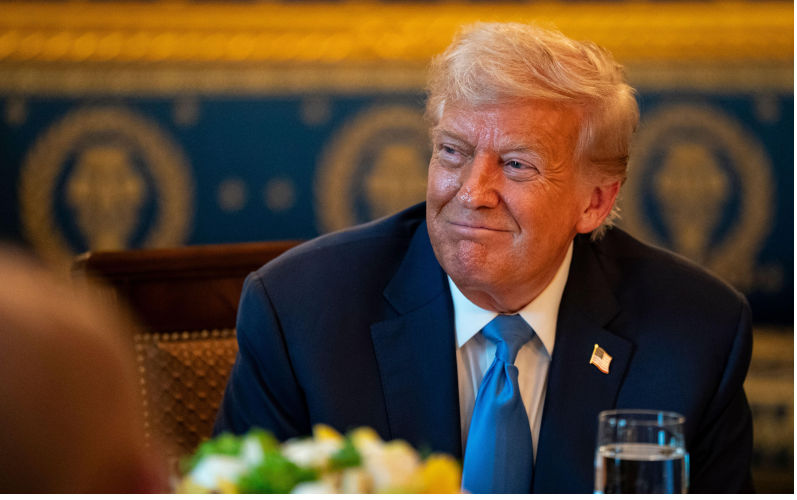Trump’s war for peace: How the Nobel became his battlefield
October 15, 2025
Donald Trump’s pursuit of the Nobel Peace Prize has been one of the most grotesque spectacles of the modern era – a man trying to win a peace prize by promoting war.
It revealed not just Trump’s character, but the deep corruption of a world order that still rewards power over justice.
From the moment he entered office, Trump saw “peace” as another brand to sell, a stage on which to show his own greatness. But he also understood that, in the theatre of empire, peace is not achieved through restraint; it is won through domination. His foreign policy, far from pacifist, weaponised violence as spectacle. It was not peace he pursued, but the appearance of peace secured through overwhelming force.
His first term made this plain. Trump unleashed record arms sales, tore up treaties and assassinated foreign leaders, then boasted that these acts of aggression were “bringing peace.” When he ordered the drone killing of Iranian General Qassem Soleimani in 2020, the world held its breath, fearing escalation. Trump, however, presented it as the prelude to calm violence, as a precondition for peace, war as marketing for a Nobel Prize.
Every diplomatic gesture was militarised theatre. When he met Kim Jong-un, he did so under the shadow of “fire and fury”, using the threat of annihilation as leverage. When he pushed the so-called “Abraham Accords”, he didn’t end a war; he monetised alliances between armed regimes. Those accords were peace for arms dealers, not for the Palestinians. The same White House that boasted of peace in the Gulf was simultaneously authorising record shipments of weapons to Israel, Saudi Arabia and the UAE – all in the name of “stability.”
Trump’s obsession with the Nobel Prize turned every war into a photo opportunity. Each bomb, each betrayal, was reframed as “strong leadership”. In his mind, the path to Oslo ran through the battlefield: the bigger the war he could bend to his will, the more he could demand global applause. When the committee refused to indulge him, he declared the whole institution corrupt, a cabal conspiring to deny him what he had “earned” by bullying adversaries into submission.
Now, in his second presidency, the logic has intensified. He has revived the rhetoric of “peace through strength”, but stripped it of any irony or restraint. The message to the world and to Israel is unmistakable: do what you want, America will call it peace. Under his watch, the destruction of Gaza has been framed not as horror but as “counterterrorism”, another step toward a “lasting peace” that will never come.
Trump’s peace is the peace of ruins, the silence after conquest. It depends on forgetting that every act of domination breeds new resistance. It is the same logic that underpinned every empire that claimed to bring order while exporting war: Rome’s Pax Romana, Britain’s “civilising mission”, America’s “war on terror”. Trump merely stripped away the hypocrisy and said the quiet part out loud: might makes right, and those who win get the medals.
But even the Nobel Committee, with all its contradictions, could not stomach awarding peace to a man who worships violence. The irony is that his failure to win it became his proof of righteousness, the world’s rejection cast as persecution, the prize withheld as evidence of bias. In Trump’s worldview, peace has no meaning beyond personal glory, history no meaning beyond ego.
However, in a cynical or perhaps too-clever-by-half-decision, the Nobel Committee this year gave the Peace Prize to Trump’s ideological mate, María Corina Machado, a hard-right figure who celebrates sanctions, privatisation and confrontation. It was less a tribute to peace than another salute to power and reaction.
Trump’s legacy is now visible in Gaza: a world where mass killing is justified as “security”, where the oppressed are blamed for their own annihilation and where the architects of atrocity still speak of “deals”. Trump’s pursuit of the Nobel Prize through warmaking exposed the moral collapse of the political class that enabled him, a class that confuses diplomacy with domination and peace with submission.
If there is any justice, Trump’s name will stand not among peacemakers but among those who proved how easily the language of peace can be turned inside out; how empire dresses its crimes in the robes of virtue. The Nobel he coveted so desperately is his perfect mirror: an emblem of a civilisation that would rather reward spectacle than conscience, truth and justice.
The views expressed in this article may or may not reflect those of Pearls and Irritations.

